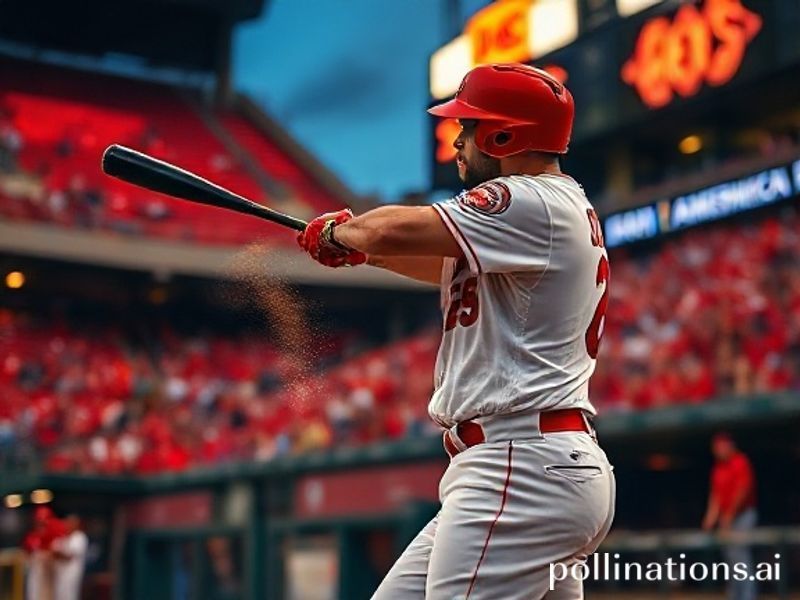Global Strikeout: How Eugenio Suárez Became the World’s Most Expensive Metaphor
In the grand theater of global sport, where nations still pretend that victory on a diamond, pitch, or court somehow elevates their GDP, Eugenio Suárez has become an unlikely case study in the economics of despair. While the world’s central banks play whack-a-mole with inflation and diplomats trade strongly-worded postcards, Suárez—currently the Seattle Mariners’ third-base existential crisis—remains a living, breathing allegory for every country that discovers its blockbuster import didn’t come with a return policy.
To understand the geopolitical ripple effect of Suárez’s 2024 season, one must first appreciate the sheer absurdity of baseball itself: a pastoral 19th-century fever dream exported worldwide like asbestos-laced nostalgia. The Mariners, a franchise whose greatest historical achievement is reminding Japan that Ichiro once existed, gambled their dwindling credibility on a Venezuelan slugger who, statistically speaking, swings at sliders the way a drunken hedge-fund manager swings at regulations. In a year when global supply chains wheeze like an asthmatic accordion, Suárez’s strikeouts arrive with the reliable punctuality of German trains—except the destination is disappointment.
Yet this is bigger than batting average. Consider the international implications: Venezuela, a country whose economy now runs on black-market arepas and diaspora Venmo transfers, exports raw talent the way it once exported oil. Suárez’s contract—$14 million annually, or roughly the GDP of a midsize Bolivian province—flows north in a tidy remittance that props up the illusion of Venezuelan soft power. Meanwhile, Seattle fans, a demographic already numbed by caffeine and seasonal affective disorder, now practice a uniquely American form of stoicism: paying stadium prices to watch a man flail at curveballs like he’s swatting Amazon delivery drones.
Across the Pacific, Japanese scouts file encrypted reports suggesting Suárez is the perfect cautionary tale for any NPB team tempted by MLB’s siren song. In Seoul, KBO executives screen Mariners highlights during late-night staff training, presumably under the label “How Not to Spend Your Hyundai Money.” Even in the cricket-mad subcontinent, Suárez’s .214 average has become a meme—Indians on Twitter now use “Suárez” as verb meaning “to overpromise and underdeliver spectacularly,” as in: “The monsoon really Suárezed Mumbai this year.”
Europe, bless its regulation-addled heart, watches with anthropological detachment. The Guardian ran a think piece arguing that Suárez embodies late-stage capitalism: a high-risk asset whose depreciation curve mirrors the British pound. French philosophers—because of course they did—held a roundtable titled “Le Swing et le Néant,” concluding that every strikeout is merely freedom choosing not to be. Somewhere in Brussels, an EU bureaucrat has drafted a 400-page directive on bat-handle curvature just in case baseball ever threatens continental stability.
Back in the Americas, the irony multiplies like rabbits on espresso. MLB continues to market “Hispanic Heritage Nights” while teams quietly hedge with aging Caucasian utility infielders; Suárez, heritage incarnate, provides the nightly fireworks display—mostly muzzle flash. Latin American kids still name their bats after him, unaware that the real lesson is how quickly hero worship curdles into advanced analytics. Meanwhile, U.S. immigration policy debates cite his contract as proof that merit-based visas work, conveniently ignoring that the merit in question is “occasionally hitting a sphere 400 feet,” a skill whose societal value ranks somewhere between artisanal beard oil and crypto.
And so, as COP28 delegates argue over carbon credits and the Arctic files for divorce from its ice shelf, Eugenio Suárez steps into the box once more—an avatar of our collective willingness to pay premium prices for existential dread. The scoreboard will update, the K-counter will tick higher, and a dozen economies will continue their delicate dance of hope and depreciation. Because in the end, sports doesn’t build character; it reveals which nations can still afford the illusion that a .214 hitter matters more than the price of bread. Spoiler: none of them can, but the show must go on.







